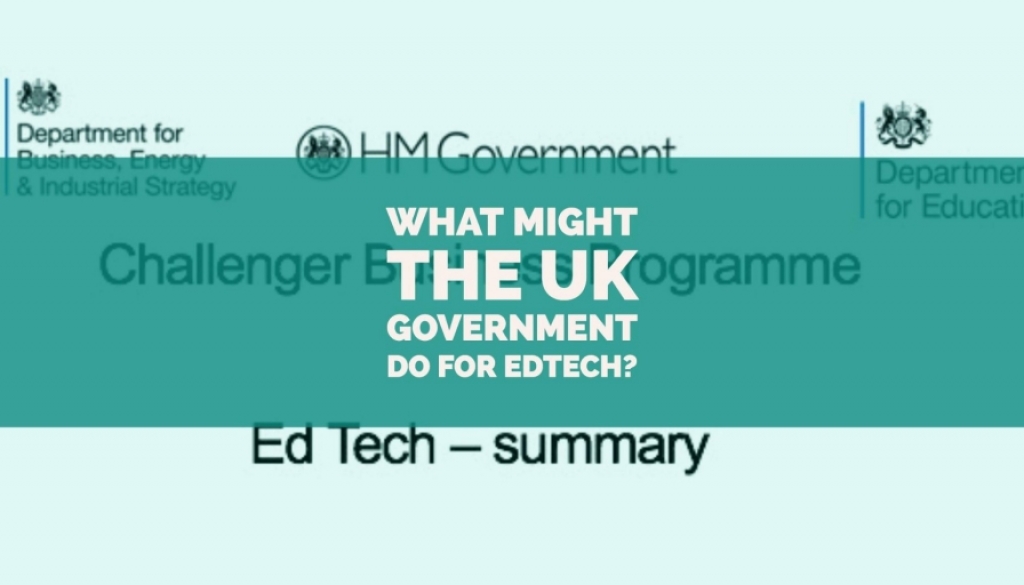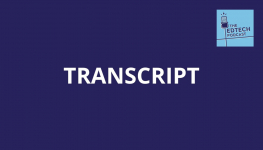What could the UK Government do for Edtech?

In a couple of recent episodes of The Edtech Podcast, I alluded to work being done by the UK Government on the opportunity of edtech from an educational and business point of view.
Two newish appointees have been made – Bridie Tooher, Head of EdTech Policy and Data Strategy at Department for Education and Alex Waters, Department for Education – to focus on what barriers currently exist and to deliver effective and supported Government policy to help overcome them.
At the end of last year, an Edtech Challenger Business programme was held to bring together a meeting of minds between the Department for Business, Energy and Industrial Strategy, the Department for Education and around 50 educational innovators.
I attended and contributed along with many familiar faces including Lord Jim Knight of TES, John Lloyd from ClearlySo, Bukky Yusuf from Clapton Girls Academy and Caroline Wright from BESA.
The main aim of the session was to reach a consensus on how the UK Government might use its muscle to promote and support meaningful edtech, overcoming barriers and offering up coordinated solutions.
The priority areas to be addressed were identified as the following by the group attending:
- Overarching strategy and support
- Broadband
- Guidance
- Market and evidence
- Funding
- Data
- Exports
- Digital skills
- Role of Ofsted
- Training and CPD
- Edtech in assessment
Below I list the notes back from the BEIS/DFE Edtech Challenger group on each of these areas. Please note: these represent the thinking of the collective groups attending and are not assigned to any one person or BEIS.
Solution highlights include a potentialteacher workload challenge fund, a mandated appointment of a paid digital champion for each school, tax breaks for teachers investing in CPD, anaccredited ‘tripadvisor for edtech solutions’ and to mimic the USA’s National Broadband Plan to get high quality broadband to each school fast.
I’d love to know your feedback – what you agree with, would like to tweak, or disagree with – on the below. Sharing has been approved to continue to build on the ideas put forward, so contribute if you have something to add.
I hope to feature Bridie and Alex on The Edtech Podcast soon. What qs or comments would you like to ask them? And finally, if you’re reading this from outside the UK what is your own Government’s policy or approach on edtech?
…Write-up of workshop event in BEIS, 1 Victoria Street, 5 December 2016: Edtech Challenger Business Programme Summary
What are the current barriers?
‘EdTech sector lacks overall strategy, led by government. Schools need a sense of national EdTech priorities. Strategy needs leadership within schools, but heads and governors are not always sufficiently informed and there is little collaboration between schools.’
Options for addressing challenges
‘Focus should not be on the technology, but:
- Effective school administration and operations
- Teaching aids to saving teacher time
- Comms to parents (save paper!)
Some felt “Strategic Leadership of ICT” (SLICT model), developed by BECTA and still used in Japan was a good model.’
What are the current barriers?
‘Many primary schools are not reached by high speed broadband. Nearly 60% claim to be poorly served, limiting access to cost-saving tools for school administration as well as learning and assessment software. If homes also lack broadband access, online homework may be impossible.’
Options for addressing challenges:
‘DCMS should prioritise schools, and set a national commitment for all schools to have [X] speed broadband by [20XX] (similar to hospitals and surgeries under NHS Paperless 2020 plan). Agree KPIs for BT Openreach.
JISC/ JANET provide subsidised high quality connections for est 40% of schools. Regional broadband consortia: eg London Grid for Learning and some councils (eg Kent LEA) also involved.
Mimic USA’s National Broadband Plan (2010): “Every community should have affordable access to at least 1 gigabit per second broadband service to anchor institutions such as schools, hospitals, and government buildings.”
Consider school provision of tablets for children lacking access to a computer at home supports the digital inclusion agenda.’
What are the current barriers?
‘Develop clear EdTech guidance. This should be subject specific. BECTA used to do this (closed 2010) and helped schools negotiate deals. Japan still uses the BECTA learnings and has good methods for this.
Schools lack understanding of ‘basic’ EdTech provision, and how EdTech can deliver better admin or teaching. Many teachers use Twitter and Facebook to share/ find information. Schools currently mandated to inform pupils about online safety (which many say is expensive).’
Options for addressing challenges
‘Produce guidance notes (eg cloud computing due Feb2017) use DFE’s weekly email to schools and trade bodies. Work with: Teacher Workload Challenge Fund; Schools Challenge Fund; NAACE self-review framework; MATs
Support development of local P2P networks. eg innovatemyschool’s speed dating approach. TES a good example: convenient, quick, good quality good. Easy Peasy a good resource for parents.’
What are the current barriers?
‘Market is fragmented: Buyers (schools) struggle to identify sellers (good EdTech products and solutions) and there are 25k schools each with unique procurement approaches. The Education Endowment Foundation (EEF) provides a good service but validation takes too long (3 years) to keep up with product development cycles.’
Options for addressing challenges
‘EEF should produce procedural toolkits, network of ‘early adopter’ teachers to road test, showcasing best practice, brokerage role between suppliers and users. Assess comparison sites (eg Noodle, Ed Shed, Educational App Store) work? Consider a govt marketplace (EdTech G-cloud) or accreditation system/ programmes, eg aggregator website (comparethemarket or TripAdvisor style).Learn from WhatWorks Clearing House (WWC) which does this (and influencesUS policy) and RCE system that analyses classroom needs and evaluates / recommends relevant tools. Coordinate expertise left in ‘English City Learning Centres’.’
What are the current barriers?
‘Many start-ups find fundraising difficult and uncertain, which constrains their growth. There are a dozen active UK VC/ investors, but a sense of medium/ long term risks to scale-up as ‘freemium’ models (Google, Facebook etc.) take market share.
School tech budgets are falling. Current funding targets secondary level, whereas early years solutions may have higher impact. Government support needed.’
Options for addressing challenges
‘Provide dedicated government funding for EdTech R&D – balance between product development and scale-up – equity and grant. Also identify (via British Business Bank) opportunities for dedicated VC funding for EdTech. Widen awareness of R&D tax credits availability to this community.
Ring-fence funding for EdTech and reverse the decline in school EdTech budgets.’
What are the current barriers?
‘Data not managed or shared effectively: eg summer exam results only shared in Feb/ March. Schools need help/ guidance to understand good practice, including on engaging parents. Data protection presents a huge challenge for schools and EdTech providers. Lack of portability of data: If a school changes suppliers it loses this historical data. Schools need to comply EU General Data Protection Regulation; in practice are vulnerable to hackers (any known events?). 50% of teachers asked about migrating services to the cloud are worried about security (BESA survey). Online awareness/ safety is the only mandated activity. AI: eg AI-enhanced tools making decisions on assessment. Capita SIMS provides information management systems and services to the majority of schools (over 80%). They and the other MIS providers charge for their services, and need to share data in more effective way that enables robust analysis and provision of new services. ‘
Options for addressing challenges
‘A number of suggestions were made:
– Government set a vision/ principles, eg a goal that data will be available to schools and third parties, suitably anonymised etc. Precedent: Caldicott principles in healthcare.
– Appoint a National Data Guardian for Education, an overarching agency to manage and improve the sharing of data. Schools should be informed of their responsibilities to uphold international safe harbour principles on management and sharing of data.
– Build on lessons from ‘School Interchange Format’ (now A4L) initiative which brought data owners together via a shared or open standard.
– The Children Commissioners Office provides good guidance on data management and safety.
– USA has an ‘In Bloom’ service on data analytics. Consider this approach, but caution to ensure parents are consulted to be aware of data sharing proposal.
– Regulate CapitaSIMS natural monopoly more actively. Open up access to data and sharing / management of it to more providers.’
What are the current barriers?
‘British education and EdTech are well regarded internationally. Large export markets in UAE, China, Malaysia and rest of Asia, West Africa. Post-BECTA, UK lacks standards and central information hub (eg on curriculum).’
Options for addressing challenges
‘Amend DIT KPIs to better fit with this sector, prioritising the well-regarded trade shows and networking events. Engage with COBIS (Council for British International Schools), BESA, EdTech UK and EdTech Exchange. Continue to provide grants for smaller firms to attend trade shows. Australia and Canada good target markets.’
What are the current barriers?
‘Ambition to improve basic digital skills. Schools are a frontier for this. UK suffers a major shortage of software engineers and should do more to train coders, computer scientists and technicians. Computer science is only a subject at KS4 and KS5. Some companies complain they have to establish their development centres in India to access ICT skills (not to save money). EdTech companies have to compete with FinTech, and struggle to attract talent.’
What are the current barriers?
‘OFSTED doesn’t recognise EdTech, and inspections ignore EdTech solutions so schools have no incentives to invest.’
Options for addressing challenges
‘Understand how EdTech could be included in OFSTED (and other?) school assessment processes. Could OFSTED provide guidance on what ‘good, outstanding’ etc looks like in EdTech outcomes, digital records, e-portfolios, etc?’
What are the current barriers?
‘Government mandates all teachers take 6 days CPD per year. Teachers value EdTech tuition, typically through a blend of face-to-face and online tuition, with support for implementation in classrooms. Providers are increasingly offering blended packages of training, software, infrastructure and support. NB. Challenges: most CPD spend is on most senior teachers. Churn (esp London) depletes skills, but also an opportunity to disseminate good practice.Options for addressing challenges
There are insufficient materials to train teachers, and to learn how to fit EdTech solutions into learning needs. US-based ISTE (International Society for Technology in Education) provides networking/ learning events for teachers.’
Options for addressing challenges
‘Mandate a (paid) digital lead for each school. Mainstream EdTech (including data management) into teachers’ standards. Include in induction / Initial Teacher Training and target Teaching Assistants who stand to gain much from this. Consider professional EdTech qualifications for business managers and technicians; or adopting US approach: teachers have to recertify every x years (American Board for Certification of Teacher Excellence) and so have a real incentive to upskill. Consider tax breaks for teacher CPD, as they do in USA. Range of potential sources for developing CPD content and standards:
– College of Teaching, National College for Teaching and Learning, Teacher Development Trust
– Computing at Schools ‘master teachers’
– NAACE Mark for Service Providers (has an EdTech award)
– Ask Islington (Katy Potts)
– TES Global; ‘Futurelearn’ (OU MOOC, effective with teachers).
– Ask Trade Bodies’
What are the current barriers?
‘Assessment: exams should test thought processes and the profile of learning. EdTech (incl AI) tools can help.’
Options for addressing challenges
‘eg A new generation of VLE (Virtual Learning Environments) approaches has emerged worth considering. Consider how to assess online/ non-school based learning (eg OU, TEDx).’
I hope you enjoyed this overview and do post your comments below. The Edtech Podcast LIVE series will seek to address some of these issues in a series of LIVE podcast events during 2017. More in the link below.













